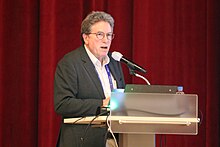David J. Anderson (born 1956) is an American neurobiologist. He is a Howard Hughes Medical Institute investigator. His lab is located at the California Institute of Technology, where he currently holds the position of Seymour Benzer Professor of Biology, TianQiao and Chrissy Chen Leadership Chair and Director, TianQiao and Chrissy Chen Institute for Neuroscience.[1] Anderson is a founding adviser of the Allen Institute for Brain Research,[2] a non-profit research institute funded by the late Paul G. Allen, and spearheaded the Institute's early effort to generate a comprehensive map of gene expression in the mouse brain.[3]
David J. Anderson | |
|---|---|
 | |
| Born | 1956 (age 67–68) |
| Alma mater | Rockefeller University |
| Awards | W. Alden Spencer Award (1999) |
| Scientific career | |
| Fields | Neuroscience |
| Institutions | Caltech |
| Doctoral advisor | Günter Blobel |
| Other academic advisors | Richard Axel |
He is the author of The Neuroscience of Emotion: A New Synthesis with Caltech neuroscientist Ralph Adolfs.[4]
Anderson received an NSF Presidential Young Investigator Award in 1986, the 1999 Alden Spencer Award from Columbia University, and a Paul G. Allen Distinguished Investigator Award in 2010.[5] In 2017, he won the 17th Perl-UNC Neuroscience Prize and in 2018, he won the Edward M. Scolnick Prize in Neuroscience.[6][7]
Research edit
Anderson's work (mid 1980s–early 2000s) focused on the development and function of the nervous system, particularly the mechanism of fate determination of neural stem cells. His laboratory's current focus is to dissect genes and neural circuits underlying innate behaviors and associated emotion states, such as fear and aggression.[8]
At Caltech, Anderson has overseen projects such as studying aggression in fruit flies.[9] He has also studied the mechanisms of fear[10] and touch,[11] and the neural activity in the brains of mice during social behaviors such as mating and aggression.[12]
Positions edit
He was elected a Fellow of the American Academy of Arts and Sciences in 2002.[13][14] In 2007, he was elected a member of the National Academy of Sciences.[15]
Anderson was trained by two Nobel laureates, Gunter Blobel and Richard Axel.
Select Publications edit
Books edit
Anderson, David J; Adolphs, Ralph (5 June 2018), The Neuroscience of Emotion: A New Synthesis, Princeton University Press, ISBN 9780691174082
Anderson, David J (15 March 2022), The Nature of the Beast: How Emotions Guide Us, Basic Books, ISBN 9781541674646
References edit
- ^ "Tianqiao and Chrissy Chen Institute for Neuroscience". www.neuroscience.caltech.edu. Retrieved 2019-01-25.
- ^ "Allen Institute | Understanding the complexities of bioscience". alleninstitute.org. Retrieved 2019-01-25.
- ^ Allen, Paul G. (2012). Idea man : a memoir by the cofounder of Microsoft. New York, NY: Portfolio/Penguin. ISBN 9781591845379. OCLC 815648823.
- ^ Bauer, Elizebeth (2018-06-18). "A pair of neuroscientists finds that investigating emotions is easier done than said". Books et al., Science Magazine. Retrieved 2019-06-13.
- ^ "David J. Anderson". www.bbe.caltech.edu.
- ^ "Professor David J. Anderson", Caltech
- ^ Pryor, Julie (2018-05-03). "McGovern Institute awards 2018 Scolnick Prize to David Anderson". MIT News. Retrieved 2019-06-13.
- ^ Gorman, James (2014-02-03). "To Study Aggression, a Fight Club for Flies". The New York Times. Retrieved 2019-06-13.
- ^ "To Study Aggression, a Fight Club for Flies", The New York Times, Feb 3, 2014
- ^ "Delicate balance in the brain controls fear", Science Daily
- ^ "Massage Sets Off Skin's Feel-Good Neurons", Futurity, Feb 1, 2013
- ^ "Mini-microscopes reveal brain circuitry behind social behavior", Science Daily, Oct 31, 2017
- ^ Mossman, Kaspar (2009-10-20). "Profile of David J. Anderson". Proceedings of the National Academy of Sciences of the United States of America.
- ^ "Book of Members, 1780-2010: Chapter A" (PDF). American Academy of Arts and Sciences. Retrieved 17 April 2011.
- ^ "Anderson, David J." National Academy of Sciences. Retrieved 17 April 2011.